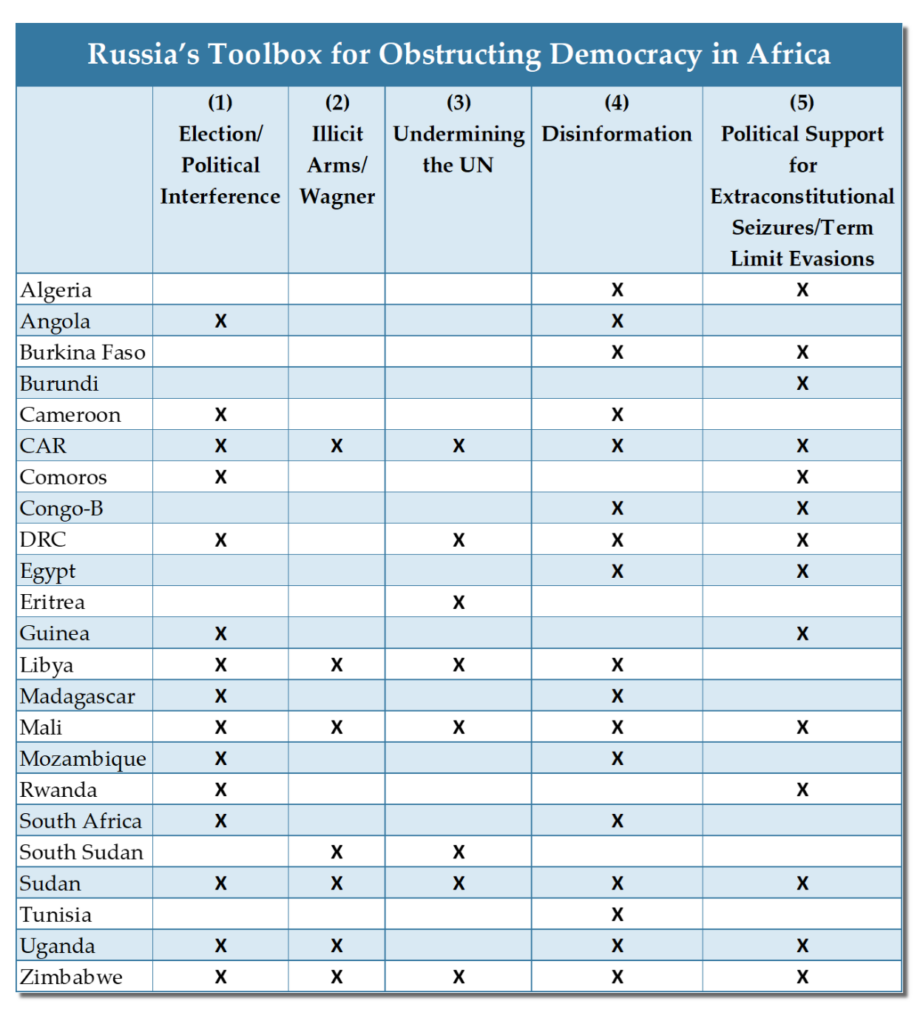Systematic efforts by Russia to undercut democracy in Africa have inhibited democratic development in two dozen African countries.
There has been much attention given to democratic backsliding in Africa in recent years. According to Freedom House, 31 African countries have seen their democracy scores decline over the past 5 years. Less well appreciated is the role that external authoritarian actors have played in facilitating this deterioration. Russia stands out in this regard. Among other aims, undermining democracy has been a strategic objective of Russia’s Africa policy for the past two decades. Authoritarian governments lacking domestic checks and balances provide permissive environments for enabling Russian influence on the continent. Normalizing authoritarianism abroad, meanwhile, validates Russia’s nondemocratic governance practices at home.
Russia’s disruption of democratic processes occurs through both official channels (such as blocking UN resolutions condemning African regimes’ human rights abuses or fraudulent electoral claims) and irregular means (such as disinformation campaigns targeting democratic proponents, election interference, the deployment of Wagner paramilitary forces, or illicit arms for resources deals). As the nature of these irregular interventions is intentionally opaque, the depth of Russian intervention is often unclear. Nonetheless, the breadth of Russia’s efforts to undermine democracy in Africa is remarkable, having actively deployed at least one of these tools in 23 African countries spanning the continent.
The effect of these interventions is to thwart the aspirations of the three-quarters of African citizens who want to see democracy flourish in their countries, thereby weakening African voices, sovereignty, and self-determination.
Highlights
- Russian interference to undercut democracy in Africa occurs across a range of methods with disinformation (17 countries targeted), electoral interference (15), and support for extraconstitutional claims on power (14) being most common.
- Russia’s methods of democratic interference in Africa tend to be reinforcing. Disinformation campaigns are nearly always accompanied by efforts to interfere in elections to keep Moscow-friendly regimes in power, to support their extended tenures in office beyond constitutionally mandated term limits, or to validate coups.
- Russia primarily targets African countries with relatively weak democratic institutions. The median Freedom House freedom score (on a scale of 0-100) for African countries in which Russia is actively undermining democracy is a 28. This compares to a median score of 51 (nearly double) for African countries that Russia is not recognized as undermining.
- In African countries where Russia is most active (i.e., engaging in four or five of the identified undermining elements), the median freedom score is just 19.
- Russia is, thus, helping prevent political rights, civil liberties, and checks and balances on the executive branch from gaining traction in some of the continent’s most enduring authoritarian systems. As a result, despite massive popular protests for democracy in places like Algeria, Guinea, Sudan, Uganda, and Zimbabwe, exclusionary regimes persist.
- The notable exception to this pattern of targeting countries with weak democratic institutions is South Africa, which is recognized as having some of the strongest checks and balances on the continent. This reflects the opening Russia perceives it can exploit to coopt South African leaders and gain further influence.
- 11 of the 23 African countries where Russia is actively undermining democracy are in conflict. This represents three-fourths of all African countries in conflict.
- Many of these conflicts are internal, resulting from the unwillingness of ruling parties to share power. Russia’s thwarting of democracy in these countries is effectively prolonging these conflicts by blocking mediated political solutions. Russian support to the military government in Sudan, for example, helped derail the planned democratic transition there, precipitating the ensuing conflict.
- Non-coincidentally, 7 out of the 10 African countries with the highest levels of forced population displacements have been targets of Russian interventions to undercut democracy.

Additional Resources
- Samuel Ramani, Russia in Africa: Resurgent Great Power or Bellicose Pretender? (London: Hurst, 2023).
- Gorden Moyo, “Russia’s Expanding Footprint in East and Southern Africa,” unpublished working paper, March 2023.
- Joseph Siegle, “Intervening to Undermine Democracy in Africa: Russia’s Playbook for Influence,” Democracy in Africa, February 20, 2023.
- Julia Stanyard, Thierry Vircoulon, Julian Rademeyer, “The Grey Zone: Russia’s Military, Mercenary and Criminal Engagement in Africa,” Global Initiative Against Transnational Organized Crime, February 2023.
- Roger Cohen, “Putin Wants Fealty, and He’s Found It in Africa,” The New York Times, December 24, 2022.
- Dzvinka Kachur, “Manifestations of Russian Formal and Informal Strategies in Southern and Eastern Africa, 2000-2022,” South African Journal of International Affairs 29, no. 4, December 5, 2022.
- Africa Center for Strategic Studies, “Mapping Disinformation in Africa,” Infographic, April 26, 2022.
- Joseph Siegle, “How Russia is Pursuing State Capture in Africa,” LSE Africa Blog, March 21, 2022.
- Gyimah-Boadi, Carolyn Logan, and Josephine Sanny, “Africans’ Durable Demand for Democracy,” Journal of Democracy 32, no3, July 2021.
- Africa Center for Strategic Studies, “A Light in Libya’s Fog of Disinformation,” Spotlight, October 9, 2020.
- Africa Center for Strategic Studies, “Russian Disinformation Campaigns Target Africa: An Interview with Dr. Shelby Grossman,” Spotlight, February 18, 2020.
- Luke Harding and Jason Burke, “Leaked Documents Reveal Russian Effort to Exert Influence in Africa,” The Guardian, June 11, 2019.
- Michael Schwirtz and Gaelle Borgia, “How Russia Meddles Abroad for Profit: Cash, Trolls and a Cult Leader,” The New York Times, November 11, 2019.

